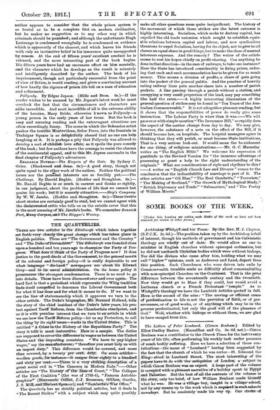THE QUARTERLIDake
Tema are- tit°. akticles' in the. Bdielereh:- whicif.takeu .togethee :eet fbrtheverr cleittlY'tlie-great ohange which leteriaikeir -pima- in These are "The Government and the Country" and "The Dulteef-Devonshiee- Tleflannettrele vetteldundedclese uponairundred and ten years-ago techenzpime the Party of- Pre' Irene Whet dcietie'thirtle of the-Party-of Pedgreat-now ? It does justice to the goedeleede of the-Government, to. the geatendmerile of its colonial and foreign policy-‘--it.really deplorable- to see what language, " die=hard' newspapers nee, about Sit Edward Grey—and teeitie natal edennestetition. On. its'. home policy it "Tenon/tees the-strongest condemnation. There is no need to go into details. These hive beet discussed-over-and-ever again:, The hardlact is-that aperiodical which' represeete the Whig tradition finds-itself compelled to denounce the Liberal- Government both .for what it hate-done and for .what'it meant' to do; If : we wantte :see the line- of statesmanship which it approves we turn to the other artiele.: The biographer; 31f#: Bernard Holland, tell* the story of • the-chief- incident of the. Delrees later years,- his pro' -test against Tariff' Reform, from the Chaniberlabe standpoint, and -soit is with peculiar interest-that-we turret-0 anatticle in which -we-see-how-the Tariff Reform policy—let us say Protection, to call the thtagby its rightr-nanieWorkein thertinited-Statee.. This is entitled,'" A. Crisktirethe History-of the. RepublicaterParty." The -story it tells is most instructive. Here is a sample: The- defies are supposed to coverthe dif' ferenceitiwagewas between theUnited States and the importing countries. " We have- to -payhigher wages," say the atettefeetterete-retherefere you- must liele usi with an import-- dirty," This difference would be covered, and- more than covered,- by • a twenty 'peie cotta dtitY. On sonie artielew woollen- goods, for -instance—it-ranges, from-esighty te a- htmdeett and sixty per'-cent eaeoehere is a very sttiking desetiptionti of a great social evil in "The Camorra in Modern Italy."—Other articles are "The Histetee •oftlie- Ineisrof Court," "The Collapse of the Hirst Coalition" (the war of 1793-4), "Famous Autobio- graphieser (Heeevenefo- Cellini, Je-J. Rousseau, Gibhon; Goethe, J. S. Mills andIfiebertiSnencer)i and GambettsfteWite Office."
The Quarterly has no strictly- political_articles, but it deals in " The Recent Strikes". with a subject which may quite possibly make all other-questions seem quite insignificant. The history of the movement of which these strikes are the latest outcome is highly interesting. Socialism, which seeks to destroy capital, baa expelled the old trade unionism which sought to-establish eqint- elle relations between capital and labour, and now syndicalism threatens to-expel Socialism, having for its object, not to aerate all classes an-equal share in good things, but to make the class of manual labourers supreme. And the-remedy.? The writer of the article seems to rest his hopes chietiyon profit-sharing. Can anything be done in thatdirection—in the case of railwaye, to take one instance Here the Statwharr interfered considerably in fixing prices; order- ing that such and such accommodation has to be given for so much money. This- means- a division of profits; a share of gain going into the of the general public. And the practice of heavily rating railway lines pate another share into a number of parish pockets. A line passing through a pariah without a statiree_and occupying a very small proportion-of the land, may-pay something like half the rates—,-A. highly interesting illustration of the general question of strikes-map be found in" Ten Years of the Aus- tralian. Commonwealth." It is not altogether pleasant reading, but it shows that the responsibilities of power do really give some lestrection: The Labour Party is wiser than it was.- .--We will pas over witheimpleniention " The Insurance Bill," so rapidly does the aspeceor the metier change from day to day. We may give, however, the substance of a note on the effect of the Bill, if it should' become law; on hospitals.- The hospital managers agree in thinking that they will perish, or must become State-institutions, Thatis a very-serious look-out. It would mean the banishment for one- thing; oferellgious ministratione.—Mte G. C. Macaulay writes on "The English Bible." We welcome his expression of gratitetile- to-the Revised' Verdion for " the- inmlentse-adeetitsige of possessing so great a help to' the right underetaricling of the originals." What are-considerations-of style and rhythitat to this? —A writer on-" English- Church Law and Divorce" comes to the conclusion that the indissolubility of marriage is part of it. The other articles-are-a Gil Blas," " The Real- Gambettaf " Terrorism," " The-Making oreicotland," "The Growth of Mythological Study,' " British Diplomacy and Teadet" "Submarines," and " The Poetry of William Morris:"










































 Previous page
Previous page